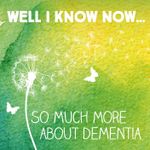Ian McMillan, Tony Husband, Ian Beesley
This week’s guests are three highly creative, very successful men who are on a mission to help those with dementia lead happier, easier, more fulfilled lives.
Their latest collaboration is a colourful one with a powerful past that stretches back to the 18th century when trades unions were illegal and women’s votes were a long way off.
They are: the Bard of Barnsley aka Ian McMillan, a man with so many titles it’s difficult to know which to choose, but I’ve plumped for poet, comic & broadcaster; internationally acclaimed photographer Ian Beesley; and last but by no means least, one of the UK’s most prolific & best-loved cartoonists, not to mention previousWell I Know Now guest, Tony Husband.
They joined me to chat about the The Unfurlings, a series of richly & traditionally embellished banners which they created with people living with dementia to illustrate the best – & worst – aspects of how we as a country and a society treat those with the condition.
Brought together in 2018 through a series of what sound like fairly riotous workshops in Exeter, the trio – along with people with dementia – compiled comments, poems, cartoons & photographs to help the public better understand what it’s really like to live with the condition.
And in that same year, the first banner was created with Yorkshire dementia & empowerment project, or DEEP, who were campaigning for those living with dementia to be better served by public transport. The Right to a Grand Day Out, as it’s called with a nod to Wallace & Gromit, was unfurled in the middle of the rush hour at York station, with Ian McMillan reading his poems. Which is altogether a wonderful image.
Many more banners followed – from the Young Dementia Leeds Cottingley Crew marching forward together against dementia to the Budding Friends Allotment Project in Exeter digging for memory & growing stories, the Hamari Yaadeen South Asian dementia café in Leeds & Bradford’s Face It Together group who work with local businesses to make facilities such as cash machines more accessible.
What links them all is colour, humour, understanding, warmth, local knowledge & a sense of shared history. Banners traditionally represented hope for the future, they showed what ordinary people could achieve when they united in a common cause.
Hosted on Acast. See acast.com/privacy for more information.
